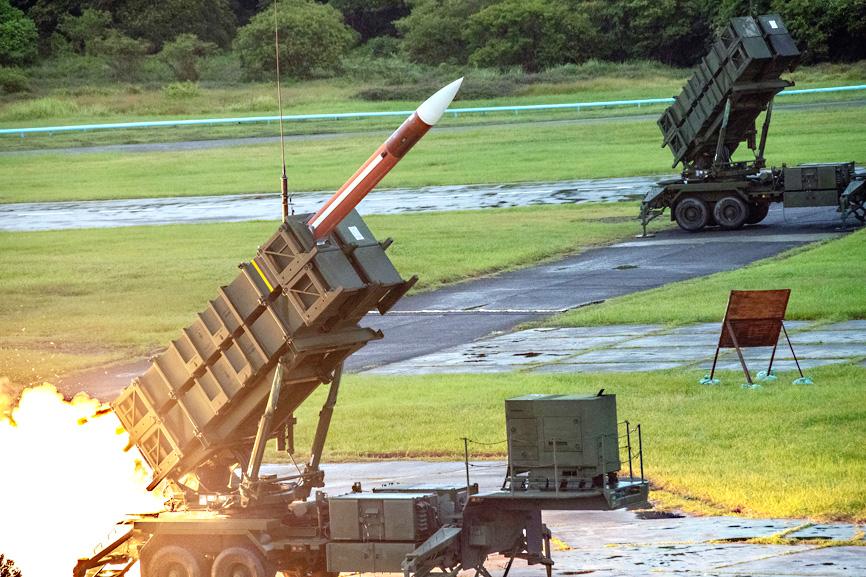The US on Tuesday announced that it has approved the sale of up to US$95 million of training and equipment to support Taiwan’s Patriot missile defense system, something Taipei said would help protect the nation from any invasion by China.
“The proposed sale will help to sustain [Taiwan’s] missile density and ensure readiness for air operations,” the Pentagon’s Defense Security Cooperation Agency said in a statement.
It added that Taiwan would use the proposed training and equipment as a “deterrent to regional threats and to strengthen homeland defense.”

Photo courtesy of Ministry of National Defense via CNA
The Ministry of Foreign Affairs welcomed the arms deal — the third approved by US President Joe Biden’s administration.
“In the face of China’s continuing military expansion and provocation, Taiwan must fully demonstrate its strong determination to defend itself,” the ministry said in a statement.
“Our government will continue to strengthen our self-defense and asymmetric combat capabilities,” it added.
The Ministry of National Defense said the deal is expected to take effect in one month.
The latest arms purchase comes as Taiwan closely watches the ongoing Russia-Ukraine war, as it also lives under the constant threat of an invasion by a giant neighbor.
The Chinese Ministry of Foreign Affairs yesterday condemned the deal, saying it “severely harms US-China relations, and the peace and stability of the Taiwan Strait.”
“China will take resolute and forceful measures to resolutely defend its own sovereignty and security interests,” ministry spokesman Zhao Lijian (趙立堅) said.
China has sanctioned US defense giants — including Boeing Defense, Lockheed Martin and Raytheon — for selling arms to Taiwan.
Beijing has ramped up its saber-rattling in recent years, sending 969 Chinese warplanes into Taiwan’s air defense identification zone last year, according to a database compiled by Agence France-Presse — more than double the roughly 380 in 2020.
Taiwan has recorded about 280 warplanes entering the zone this year.
Western powers, as well as regional neighbors Japan and South Korea, have looked on with growing alarm at Beijing’s designs on Taiwan under Chinese President Xi Jinping (習近平).
On Tuesday, Australia announced that it was accelerating plans to buy long-range missiles, citing new threats posed by Russia and China, including a potential invasion of Taiwan.
“There was a working assumption that an act of aggression by China toward Taiwan might take place in the 2040s. I think that timeline now has been dramatically compressed,” Australian Minister for Defence Peter Dutton told Seven Network television.
Washington has remained Taipei’s most important ally and leading arms supplier, despite switching diplomatic recognition to Beijing in 1979.
The Patriot is a highly mobile surface-to-air missile system that would be a crucial defense against Chinese warplanes.
Former US president Donald Trump ramped up big-ticket arms sales to Taiwan during his time in office as he feuded with Beijing on a host of issues from trade to national security.
Sales included drones, missile systems and new-generation fighter jets.

CHAOS: Iranians took to the streets playing celebratory music after reports of Khamenei’s death on Saturday, while mourners also gathered in Tehran yesterday Iranian Supreme Leader Ayatollah Ali Khamenei was killed in a major attack on Iran launched by Israel and the US, throwing the future of the Islamic republic into doubt and raising the risk of regional instability. Iranian state television and the state-run IRNA news agency announced the 86-year-old’s death early yesterday. US President Donald Trump said it gave Iranians their “greatest chance” to “take back” their country. The announcements came after a joint US and Israeli aerial bombardment that targeted Iranian military and governmental sites. Trump said the “heavy and pinpoint bombing” would continue through the week or as long

TRUST: The KMT said it respected the US’ timing and considerations, and hoped it would continue to honor its commitments to helping Taiwan bolster its defenses and deterrence US President Donald Trump is delaying a multibillion-dollar arms sale to Taiwan to ensure his visit to Beijing is successful, a New York Times report said. The weapons sales package has stalled in the US Department of State, the report said, citing US officials it did not identify. The White House has told agencies not to push forward ahead of Trump’s meeting with Chinese President Xi Jinping (習近平), it said. The two last month held a phone call to discuss trade and geopolitical flashpoints ahead of the summit. Xi raised the Taiwan issue and urged the US to handle arms sales to

BIG SPENDERS: Foreign investors bought the most Taiwan equities since 2005, signaling confidence that an AI boom would continue to benefit chipmakers Taiwan Semiconductor Manufacturing Co’s (TSMC, 台積電) market capitalization swelled to US$2 trillion for the first time following a 4.25 percent rally in its American depositary receipts (ADR) overnight, putting the world’s biggest contract chipmaker sixth on the list of the world’s biggest companies by market capitalization, just behind Amazon.com Inc. The site CompaniesMarketcap.com ranked TSMC ahead of Saudi Aramco and Meta Platforms Inc. The Taiwanese company’s ADRs on Tuesday surged to US$385.75 on the New York Stock Exchange, as strong demand for artificial intelligence (AI) applications led to chip supply constraints and boost revenue growth to record-breaking levels. Each TSMC ADR represents

Pro-democracy media tycoon Jimmy Lai’s (黎智英) fraud conviction and prison sentence were yesterday overturned by a Hong Kong court, in a surprise legal decision that comes soon after Lai was jailed for 20 years on a separate national security charge. Judges Jeremy Poon (潘兆初), Anthea Pang (彭寶琴) and Derek Pang (彭偉昌) said in the judgement that they allowed the appeal from Lai, and another defendant in the case, to proceed, as a lower court judge had “erred.” “The Court of Appeal gave them leave to appeal against their conviction, allowed their appeals, quashed the convictions and set aside the sentences,” the judges